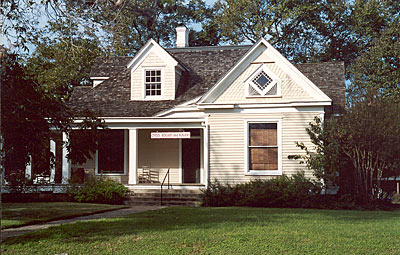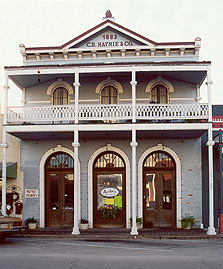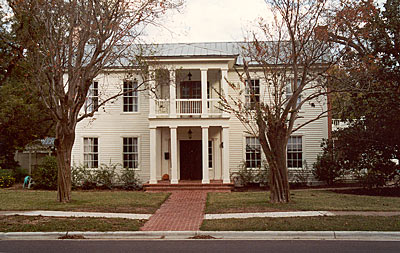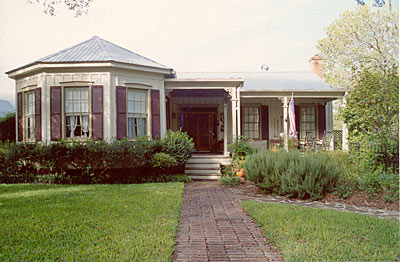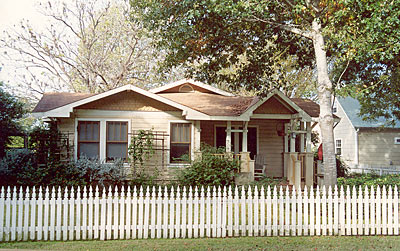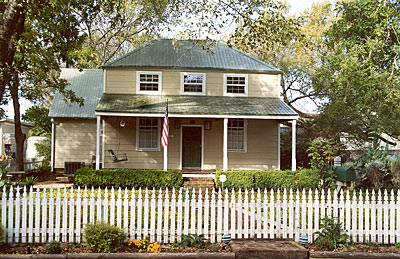|
The Bastrop County
Historical Society The annual Historic Holiday Homes Tour was held from 2:00 p.m. to 7:00 p.m. on December 14th. Seven featured homes and buildings will be on display, including the Wilbarger House built in 1842. The seven featured homes and buildings to be on display are shown below:
The Davis House--1010 Chestnut Street The Davis House fronts on the Old Spanish Trail, the street known today as Chestnut Street. The home was built in 1907 by George W. Davis, the grandson of Stephen Van Rennselear Eagleston who built the first townhouse in Bastrop.
The Haynie Building and Apartments--1010 Main Street Built in 1882 by C.R. & Alice Haynie, an unusual arrangement sold the second floor to the Gambol Masonic Lodge who maintained ownership until 1976. During the many decades, the first floor began as a grocery and market; and went through many changes over the years. The tour focuses on the second floor which now houses apartments.
The Wilbarger House--1403 Main Street Built in 1842 of hand-hewn pine and cedar by Major A.M. Brooks, the house was purchased in 1850 by James Harvey Wilbarger, the son of Josiah Pugh Wilbarger. Lore has it that Josiah was scalped and shot through the neck by marauding Indians during the early years of the Bastrop Settlement and, to cover the wound and its soft spot on the scalp , wore a black satin cap sewn by his wife. The house remains a magnificent Texas treasure.
The Jones-Powell House-1406 Wilson One of three houses in the LCRA Compound* featured on the tour-1408 and 1502 Wilson are the others-this house was often referred to as "The Stagecoach House" in the 1850's and beyond due to its proximity to the Alum Creek Way Station on the road between La Grange and Bastrop. From that simple log pen beginning, it went through several construction and design changes that took it to its 1880 Victorian look. It was moved to "The Compound" in 1984.
The Rogers House--1408 Wilson While not as "old" as its neighboring homes, this classic Arts and Crafts house fits comfortably into the concepts of the "Compound" to restore and preserve. In this case it's a bungalow of the WWII era and is a wonderful example of what can be done with what, at the time, was simply an ordinary house. Today, it's a warm classic.
The Mathis House--1502 Wilson This notable example of early Texas architecture was built by Charles J. Mathis in the 1860's on land bordering the St. Peter and Paul Catholic Church near Freisburg in Colorado County, Texas. It was used continuously as a residence until 1946 when Joseph Skalitsky purchased it and, using mules, moved it to his homestead to serve as sleeping quarters for his 11 children. The structure was part of a Historic American Building Survey by the University of Texas in 1981.
The Honeymoon Hut--907 Cedar St. Built originally in the 1880's as probably the home of the Erhard's cook, more is known about its "people history" than its construction history. It is documented that it was painted, decorated, furniture purchased, and dubbed "the Honeymoon Hut" for the arrival of their daughter, Mary Pearl, and her husband Captain Kenneth Duff, following their marriage and honeymoon in the early '40s. The hut was their home until the end of WWII. * The LCRA “Compound” began as a dream by Gerald R. Wagner, a former U. T. professor, entrepreneur, and past Bastrop city councilman. He wanted to create an artist colony on 30 acres of land along the Colorado River, near downtown, that would make use of historic homes moved to the property. As he stated in an interview with the Bastrop County Times, “This is not a commercial project; but a restoration and preservation project.”
Tickets: $10.00, Children under 12 free For Further Information:
I invite your comments and suggestions! E-mail: neil@bastroptexas.net.
Bastrop High School Class Reunions The Community |
Site Search | Meet Neil
Gurwitz | Community Calendar
Web hosting, design, and database development by
Eager Web Services, LLC |

